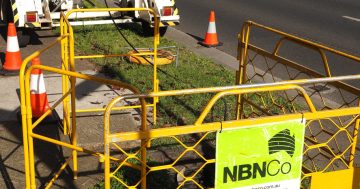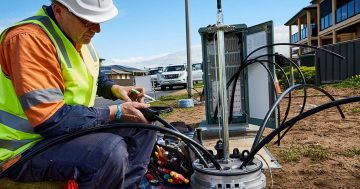
The Christmas and New Year break has long been a preferred time of year for government agencies to deliver unpopular news. However, NBN Co has taken this practice one step further than usual.
Knowing that an update for the rollout plan on the National Broadband Network could be delayed no further, NBN Co quietly removed the plan altogether from its website just before Christmas. Its new “interactive search tool” makes it much harder to compare the old rollout schedule with the new one.
Once you manually collate the dates, the truth is damning: Nearly all of the ACT has been pushed to the very back of the NBN’s revised rollout schedule.
- See ACT NBN Co Rollout Delays broken down by suburb here.
When meeting residents during the ACT election campaign last year, it would be no exaggeration to say that access to the NBN was one of the top issues raised with me.
Just 14 months ago, NBN Co was predicting that 18 of Belconnen’s 25 suburbs would have commenced NBN construction by now. Instead, all residents of Belconnen will now have to wait until at least June 2019 to receive access. Weston Creek has also been moved to the very back of the pack, as have as over half of the suburbs of Woden Valley and central Canberra.
Tuggeranong has been finally given a scheduled date for NBN availability, but this is the same “magical” date of June 2019 that fully half of all Canberra suburbs have been assigned.
Given that NBN Co had connected less than 50% of Canberra’s promised suburbs by the end of 2016, healthy scepticism about the these forecast dates seems wise. Indeed, based on current delays and rescheduling of dates the rollout of the NBN in the ACT isn’t likely to be completed until 2025.
Residents in Dunlop remain stuck on the decade-old ADSL technology. No telecommunications company is going to invest in improving fixed-line connectivity when the NBN is continually “about to be installed” everywhere.
The Federal Government’s complete lack of interest in prioritising robust broadband for its largely Canberra-based public servants is baffling. Recent studies show that the productivity benefits of telecommuting to an organisation can be worth up to 20% of an employee’s wages due to lower absenteeism, higher morale, more hours worked, improved access to highly qualified parents needing more workplace flexibility, and more productive hours worked due to fewer office distractions. But a prerequisite for effective teleworking is access to fast and reliable broadband services.
Delivering the NBN earlier in Canberra would unlock productivity benefits and cost savings, but unfortunately the Federal Government doesn’t appear to recognise the financial benefits of that outcome.





















